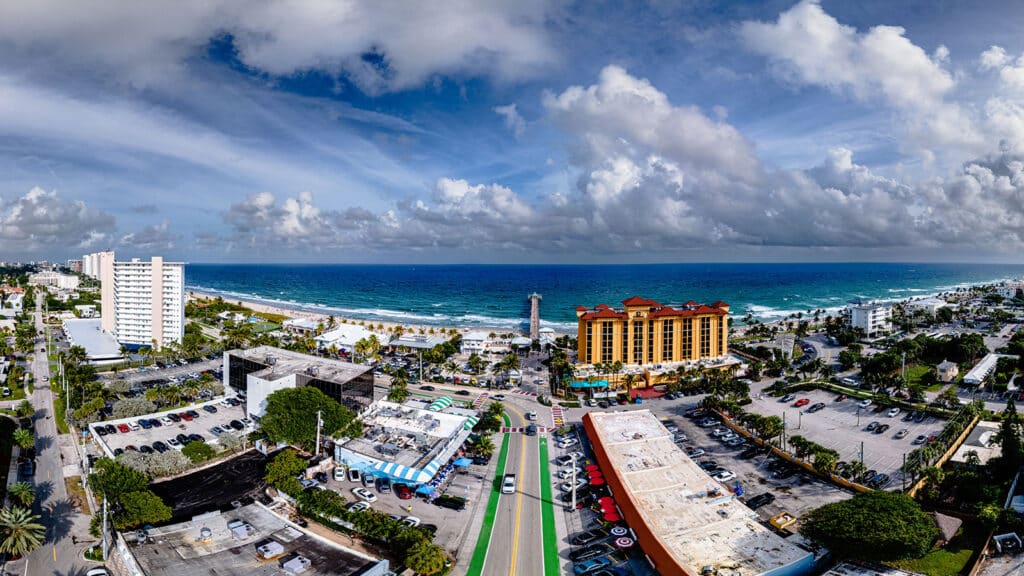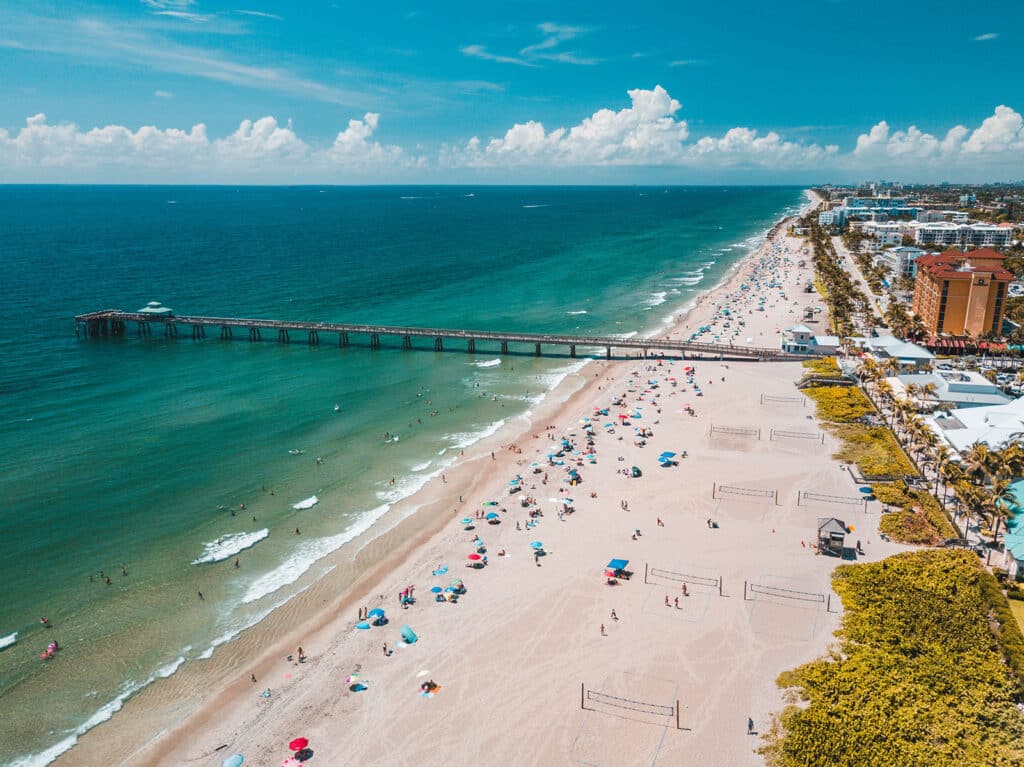Drug addiction has been an eminent problem for as long as anyone can remember. People have their first hit, fall in love with the euphoric feeling, and get hooked until they become addicts.

Unfortunately, this cycle is common in Florida, and Deerfield Beach is no exception. Since Broward County is one of the counties in Florida where prescription opioid meds are filled in massive quantities, there’s no surprise that Broward County is well known for its opioid abuse.
However, Florida has multiple top-ranking rehabilitation centers to help treat drug addiction, no matter the abused substance. Rehab centers will provide the perfect treatment regimen that best suits you, your lifestyle, and your overall case.
Before we move on to how to treat drug addiction in Deerfield, we need to cover some basics.
Table of Contents
Understanding Drug Addiction
Addiction, in general, is when a person is no longer in control over how much they consume a substance, even if it causes them harm. This term applies to drugs, alcohol, and any other addictive substance.
People may think that surrendering to addiction purely depends on a person’s motivation levels and whether their will is strong enough to fight off addiction. Surprisingly, that couldn’t be farther from the truth.
Scientists have proved that addiction is actually a neuropsychological disorder that urges the drug abuser to reach that euphoric state no matter the cost—even if it causes them harm.
That’s why motivation alone won’t fix the issue. Drug addicts need a professional that would guide them throughout their rehab and help them become truly better, not just a temporary fix.
There’ll be plenty of ups and downs on the way back from addiction, possibly a few relapses, and every patient needs the proper support through it all.
Commonly Abused Substances in Deerfield Beach, Florida
Although there are many types of abused substances in Florida, the top three in Deerfield are cocaine, opioids such as heroin, and alcohol.
Understanding Rehabilitation Treatment
Drug rehabilitation treatment is the process of undoing the damage of drug addiction. It treats addicts from their dependence on addictive substances.
Each treatment plan is a unique process that combines medical and psychotherapeutic approaches to achieve the desired results.
The treatment plans are designed specifically for each patient based on their situation, the severity of their addiction, and lifestyle.
Luckily, Deerfield Beach has many specialized rehab centers that tackle all different types of addiction, but the majority focus on alcohol and drug addictions.
Types of Drug Rehab Treatments in Deerfield Beach, FL
There are many types of rehabilitation treatments, and luckily, all of them could be found in Deerfield Beach.
The different types cater to every unique case to offer the best possible treatment program and make it easier for patients to follow through with their treatment and avoid relapsing.
These types of treatments include:
Detox Programs
Detox programs are the first step in almost every treatment program, especially if the addiction is severe or has been going on for a long time.
The detoxification step is the part where you remove any traces of the abused substance from the patient’s system. It’s done within a controlled environment to help the patients go through their withdrawal symptoms safely and have all the needed medical and emotional support.
Think of it like giving your patient a clean slate to begin their treatment journey.
Inpatient Treatment
Inpatient treatment, or residential treatment, is prescribed for patients who need to stay at a rehab facility. That way, they can be under 24-hour surveillance, and receive the medical care they need for as long as it’s necessary for their case.
The benefit of this treatment program is helping patients improve drastically by simply focusing on their well-being away from any distractions or triggers. In other words, it shows how well they can be without drugs and guides them toward the beginning of their rehabilitation journey.
Partial Hospitalization Programs (PHP)
Otherwise called day programs, partial hospitalization programs are less severe than inpatient treatment but still very hands-on. In these programs, patients must attend meetings for 4 to 7 days each week, then they get to go back home by the end of the day.
These meetings would typically include family counseling, group therapies, and medication monitoring. So PHP patients could have the same amount of daily meetings and checkups as an inpatient if necessary, but without staying at the hospital.
Intensive Outpatient Programs (IOP)
This treatment program is related more to outpatient treatments than to inpatient, but it’s a little more intense than outpatient programs.
The program is about going over every little detail of the patient’s life and curating a customized schedule that covers everything about the patient’s daily life, including their friends, family, work, school, and social life.
The goal is to plan everything as much as possible and leave no room for addiction to seep back in and trigger a relapse.
Outpatient Programs
An outpatient program is best for patients who don’t require 24-hour close monitoring or detoxification. They could also be prescribed for patients with mild to moderate addiction because they don’t usually need full-time residence at a facility.
All they need is an inclusive daily schedule to help patients easily adapt to their new healthy lifestyle and prevent anything that might trigger a relapse. Of course, like other therapies, they’ll have scheduled meetings to check up on the patient regularly.
Halfway Houses
After finishing the cleansing part of their treatment, then the strategic and habitual part, the patients are almost done! However, some may still be too afraid to go back home or to go back to their old life. Some might not even have a place to go after finishing their treatment.
This is where halfway houses step in. Halfway houses or sober living homes are considered a transitional phase between inpatient residential treatment and being on your own out in the wild.
Individual Counseling
Individual counseling is a crucial part of almost every treatment program. Patients need to heal mentally as they are physically. This is where one-on-one counseling can work its magic.
They need to learn how to dig deep and find the root of their addiction, switch the unhealthy mindset that put them there in the first place, and learn how to cope with any cravings or low times by using cognitive behavioral therapy (CBT).
Family Therapy
Everyone knows how hard the experience is for any patient, but no one considers how hard it is on their family and loved ones.
That’s why family therapy is for both; the patient and their family. It’s for the patient because their family learns how to deal with the patient when they come back home after rehab.
Meanwhile, it’s meant for the family, too, because it works on any unsolved damage caused between the patient and their family when they were addicted and not acting like themselves.
Group Counseling
This type of therapy is basically the complete opposite of individual counseling. This type of therapy is about making you feel like you’re not alone. You get to meet many people who have been through exactly what you have, and they understand your traumas and struggles.
It gives the patient a sense of safety and that they can now belong to a unique community that supports one another and always have each other grounded.
12-Step Programs
You might’ve heard about this type of treatment under the name Alcoholics Anonymous (AA) or Narcotics Anonymous (NA).
AA and NA are detailed 12-step programs that spread out a patient’s treatment journey over specific steps. These steps should teach the patient how to overcome addiction, avoid triggers, and become overall healthy.
Aftercare Programs
This type of treatment is the last step to wrapping up a fruitful rehabilitation journey. Patients who have finished their treatment programs need to follow up with aftercare programs to reinforce prevention strategies and offer continued support.

Local Resources and Support Systems
1. Florida Statewide Substance Abuse Hotline (211)
Available 24/7, this hotline is there to support anyone in a drug-related crisis. You could also ask the representatives to recommend a few options for addiction treatment centers near you.
2. Substance Abuse and Mental Health Services Administration (800-662-HELP(4357))
This administration offers help to both English and Spanish-speaking callers who are looking for support with their addiction problem.
They provide excellent referrals to treatment facilities, 12-step meetings and support groups, community-based services, and other treatment services based on every case.
3. Florida Public Health Department Substance Abuse Program (1-850-487-2929)
Florida Public Health Department offers a substance abuse program that provides free drug counseling and resources for the top professional addiction treatment providers all over Florida.
Wrapping Up
In conclusion, if you or someone you know are fighting off addiction and having a hard time, we’re here for you. Don’t hesitate to reach out for help and start your rehab journey right away.
No matter how deep you fall into addiction, or how hard you think it is to come back from such a dark place, don’t lose hope in being better. We can help you cleanse your body, mind, and soul, and have you ready to turn your life around,
Contact us at the Miracle Recovery Center, and leave the rest for us to handle.

